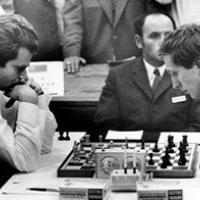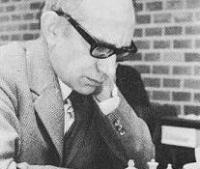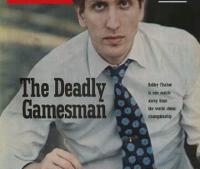
He Learned Directly from God, pt 4
In January 1963, Bobby again won the U.S Championship, with 8 of 11. In this championship, he lost a game to Edmar Mednis, his first ever loss in U.S. championship history. He started with only 2 points from 4 games, but winning the game in the fifth round vs. Reshevsky was important, and he recovered to share the lead with 7 of 10 with Bisguier. Then in the last round, he beat Bisguier to win his fifth U.S. Champion title.
He declined an invitation to play in the Piatigorsky Cup tournament in Los Angeles, which had a world-class field. His decision was probably influenced by ill-will over the aborted match against Reshevsky in 1961, which had been arranged by the same organizer. He won the Western Open in Bay City, Michigan with 7, 5 of 8, then won the New York State Open, with a perfect score, 7 out of 7. In November he was to play four hundred opponents at once in an exhibition, but it was postponed because of President Kennedy's assassination.
In the 1963–64 U.S. Championship Fischer finished with 11 out of 11!!! "To demonstrate convincingly to the opposition, that he was now in a class by himself." This stunning result brought Fischer heightened fame, including a profile in Life magazine. Sports Illustrated diagrammed each of the 11 games in its article, "The Amazing Victory Streak of Bobby Fischer". Such extensive chess coverage was groundbreaking for the top American sports magazine.
Fischer, eligible as U.S. Champion, decided not to participate in the Amsterdam Interzonal in 1964, thus taking himself out of the 1966 World Championship cycle. He held to this decision even when FIDE changed the format of the eight-player Candidates Tournament from a round-robin to a series of knockout matches, which eliminated the possibility of collusion. He instead embarked on a tour of the United States and Canada from February through May, playing a simultaneous exhibition and giving a lecture in each of more than 40 cities. His 94% winning percentage over more than 2,000 games is one of the best ever achieved. Fischer also declined an invitation to play for the United States in the 1964 Olympiad in Tel Aviv.
In 1965, Bobby participated in the Capablanca Memorial in Cuba, by playing through a teletype machine at the Marshall Chess Club in New York. The United States did not have diplomatic relations with Cuba, and the State Department would not authorize him to travel to Havana. Fischer played his moves from a room at the Marshall Chess Club, which was then transmitted by teleprompter to Cuba. The tournament was an "ordeal" for Fischer, who had to endure eight-hour and sometimes even twelve-hour playing sessions. Despite this handicap, he tied for second through fourth places, with 15 of 21, behind former World Champion Vasily Smyslov, whom he defeated in their individual game. The tournament received extensive media coverage.
Fischer began 1966 by winning the U.S. Championship for the seventh time; despite losing to Robert Byrne and Reshevsky in the eighth and ninth rounds, he finished with 8.5 of 11. He also reconciled with Mrs. Piatigorsky, accepting an invitation to the very strong second Piatigorsky Cup tournament in Santa Monica. Fischer began disastrously and after eight rounds was tied for last with 3 of 8. He then staged "the most sensational comeback in the history of grandmaster chess," scoring 7 of 8 in the next eight rounds. At the end, World Championship finalist Boris Spassky edged him out by half point, scoring 11.5 of 18 to Fischer’s 11 of 18; over 1,000 people watched his game with Boris Spassky, the largest audience for a chess game in U.S. history. Now aged 23, Fischer would win every match or tournament he completed for the rest of his life. His streak started at the 17th Chess Olympiad in Havana, where he scored 15 of 17 points (Petrosian scored .3% better but played fewer games and scored fewer points).
In 1967, Fischer won the U.S. Championship for the eighth and final time, ceding only three draws, with 9.5 of 11. He also won the strong tournaments at Monte Carlo with 7 of 9 and in Skopje with 13.5 of 17. Also in 1967 at the Sousse Interzonal, Fischer scored a phenomenal 8.5 points in the first 10 games to lead the field. His observance of the Worldwide Church of God's seventh-day Sabbath was honored by the organizers, but deprived Fischer of several rest days, which led to a scheduling dispute. Fischer forfeited two games in protest and later withdrew, eliminating himself from the 1969 World Championship cycle. Because he had completed less than half his scheduled games, all of his results were annulled; meaning players who had played him had those games cancelled.
In 1968, he took 1st place at Netanya, Israel, with 11.5 of 13 and 1st place at Vinkovci, Yugoslavia with 11 of 13; In 1969 Bobby finished his book, MY 60 MEMORABLE GAMES. It included 9 draws and 3 losses. In 1970, he played Board 2 in the USSR vs. REST OF THE WORLD match in Belgrade, beating Petrosian with 2 wins and 2 draws. He then went on to Herceg Novi, Yugoslavia and won the unofficial world 5-minute championship with 19 of 22, a more than convincing 4.5 points more than 2nd place finisher Mikhail Tal. Also in 1970, he took 1st at Roving/Zagreb with 13 of 17, and in Buenos Aires with 15 of 17. He played at the 19th Olympiad in Siegen, Switzerland, scoring 10 of 13. He had already separated himself as the top rated player in the world by 50 points ahead of newly-crowned World Champion Spassky, but after skipping a couple World Championship Cycles it was unclear if he would ever become World Champion.
And one trivia question: what was the result of the game being played in the picture at the start of the article?






